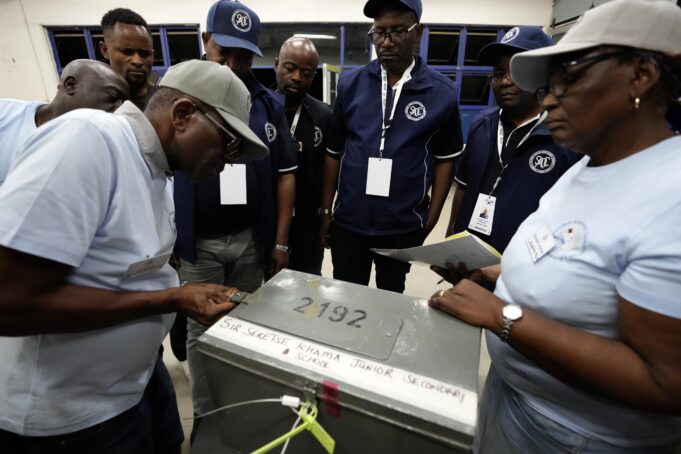When the people of Botswana voted its nearly six decades-old government out of power in October, they chose a president who appears to be in line with a new wave of progressive African leaders.
The Southern African country of 2.4 million people selected its sixth head-of-state, however, the first one unaffiliated with the Botswana Democratic Party that ruled since independence in 1966.
Botswana’s new president, Duma Boko, 54, and his Umbrella for Democratic Change (UDC) party defeated the incumbent president, Mokgweetsi Masisi, in a ballot largely driven by dissatisfaction over a sunken economy.
Botswana was considered an African success story that suffered from a global drop in demand for mined diamonds, which was 80 percent of its exports. That and high unemployment, particularly among youth, people voted for change, a new leader, and a different vision for the country.
“It is one of the rarest moments that can only be acknowledged in retrospect,” said President Boko, at his inauguration on Nov. 10. “For nearly three score years, our democracy remained unbroken, unproven, and untested. On the 30th of October this year, together, we tested this democracy,” he said.
“It is with pride, and perhaps even a tinge of relief, that I can proudly say we have passed this test with flying colors. Together, we usher in a new political dawn,” he noted.
Africa observers and analysts see the human rights attorney as the latest in a string of new leaders looking to shake up business as usual on the continent. Along that line, Mr. Boko is seen as a forward thinker and pan-African leader at a time Africa is at a crossroads of obtaining a viable future for African people amidst a volatile global environment.
Analysts say Africa’s growing geo-political significance continues to attract foreign powers. In the decades of African nations gaining independence from colonialism came several phases such as neo-colonialism, and now a renewed scramble for Africa’s mineral wealth, and foreign-induced militarism.
The continent remains central as a financial source for world powers seeking to remain viable in the 21st Century. Whether it is military or economic cooperation, the continent piques the interest of the U.S., Russia, China and others.
Notwithstanding the foreign interests, meddling, and control, moves for self-determination are also being waged across the continent.
For instance, in West Africa, new leaders in Niger, Burkina Faso, and Mali are upending unequal power equations with powers like the U.S. and France. They unified their efforts in the Alliance of Sahel States as a regional bloc.
These rearrangements include wresting control of their resources from foreign hands, expelling American and French militaries, and realigning with other global partners.
Although in Southern Africa, if remarks Mr. Boko made in a recent interview are any indication, he too wants unbalanced relationships with Africa to end and U.S. big gun politics to stop.
While sharing his thoughts on the return of U.S. President Donald Trump to a reporter, Mr. Boko said in his previous term, Mr. Trump scaled down the “self-declared” role of America as a “police force of the world.”
“We saw him withdraw American troops from various places and not participate in generating new wars, and so I hope his return means a continuation along that path,” Mr. Boko said.
His comment could indicate a sentiment that reflects a growing anti-U.S. military posture across Africa exemplified by the evictions of American and French troops from Niger, Burkina Faso, and Mali over the last two years.
On Nov. 29, Chad added itself to the chain of nations kicking the French military out in an announcement from its Foreign Ministry hours after French Foreign Minister Jean-Noel Barrot visited the country.
Chad’s Foreign Minister Abderaman Koulamallah stressed the move does not completely break ties with its former colonial power, but another notch toward self-reliance. France has 1,000 troops in the country.
On the same day Senegal’s Pres. Bassirou Diomaye Faye told AFP that the French military must also exit his nation. “Senegal is an independent country, it is a sovereign country, and sovereignty does not accept the presence of military bases in a sovereign country,” said Mr. Faye, who was elected in March vowing to end dependence on foreign powers.
“In terms of the anti-U.S. military sentiment, it’s getting stronger across the continent,” said Abayomi Azikiwe, political commentator and editor of Pan-African News Wire.
Mr. Azikiwe noted that Mr. Boko’s rise in Botswana exists in a progressive Southern African Development Community (SADC) bloc of nations known to stand for struggles in Africa and elsewhere.
“The Southern African Development Community is one of the most united and organized regional groupings on the continent,” explained Mr. Azikiwe to The Final Call.
“They support the Palestinians strongly, the people of the Western Sahara—the Sahrawi Arab Democratic Republic,” as well as its history of “liberation movements turned political parties,” he said, as examples.
Mr. Boko was elected while Africa is experiencing great transition and changes. There is a growing Pan-African movement and anti-imperialist sentiment on the continent that has popular support, say observers.
“I definitely would say that it’s the emergence of an anti-imperialist front and movement that’s not just settled within the state structures,” said Netfa Freeman of Pan-African Community Action (PACA). “But on the level of civil society and people’s organizations on the ground in those countries,” he told The Final Call.
It is important to understand that the growing sentiment has popular support because the U.S. and the West demonize those countries and progressive leaders, Mr. Freeman remarked.
In the case of the Alliance of Sahel States, they are led by military leaders. America and the West won’t highlight the role of the people developing their own structures and formations connected to what the countries are doing.
“So, it’s not just some military government doing things … some kind of populist type things that they’re claiming are for the people, but it’s actually the people involved in these things,” said Mr. Freeman. “So that’s good,” he added.













